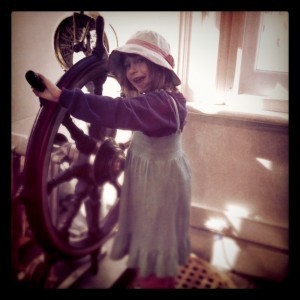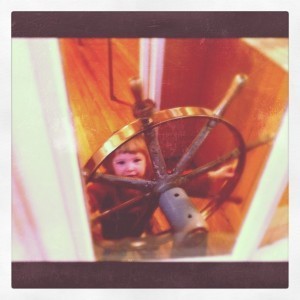Writing Fantasy: Finding the Words
 I had an amazing visit to the local Maritime Museum today, under the guidance of the most excellent Liz. Raeli and Jem had a brilliant time exploring the museum itself, which combined display and video material with some fabulous tactile exhibits such as wheels to spin, enormous brass bells to ring, and the hull of a ship for small people to hide inside (possibly this was not actually there for that purpose).
I had an amazing visit to the local Maritime Museum today, under the guidance of the most excellent Liz. Raeli and Jem had a brilliant time exploring the museum itself, which combined display and video material with some fabulous tactile exhibits such as wheels to spin, enormous brass bells to ring, and the hull of a ship for small people to hide inside (possibly this was not actually there for that purpose).
After stocking up on loot from the shop (an activity book and pirate craft project for Raeli, a pirate slinky for Jem, a book about female crewed ships for me) we were taken upstairs to view the sekrit stuff, namely the archive and private library, plus the many staff. I have to say this is the first time I have used writer credentials to get behind the red velvet curtain of anywhere! The girls were well behaved for a good 10-15 minutes as Liz showed me some of their digitised images and shared some gems about the history of the Derwent river. I already have extra Nancy ideas bubbling away, and plan to go back for more visits when not encumbered with two children with a patience time limit (well, the toddler, anyway. Raeli was a jewel the whole time, and charmingly fascinated with the place).
I'm almost at the end of the draft of the first Nancy novel, and while I'm very pleased with the writing and most importantly the scene-by-scene structure, it's not ready yet. Now that I know which time periods are going to be relevant to the story, I need to do a lot more research on what Hobart was like in those specific times, and figure out for myself what Nancy and Sylvie Napoleon were doing during those specific years.
 But there's the other thing I need to do as well, which sadly no amount of historical books and visits to museums are going to help me with (unless of course they do). I need to find my words.
But there's the other thing I need to do as well, which sadly no amount of historical books and visits to museums are going to help me with (unless of course they do). I need to find my words.
Language is one of those elements of fantasy worldbuilding that I rarely hear anyone talk about, but it's hugely important to me. Names have a power to them, and I can't get started writing until I know what my main characters are called – I'm still dealing with the emotional fallout of having to change a name in Fury, thanks to not realising until one particular scene that I had four characters whose names all began with the letter 'N' – but it's not just the names which help to form the story in my head.
Margo Lanagan once called me the 'queen of nouns,' which is one of my favourite quotes ever about my writing. I replied I think that she totally had to become the most famous of all our writing group because she writes the more inspired cover blurbs, and she replied to that by winning a bunch World Fantasy Awards and becoming super famous. What a show off.
But it's true that when it comes to fantasy, it's the nouns that pull it all together for me. Words have a power, and I love finding exactly the right ones to convey a world of significance in a single moment. I also look out for this in other works, the use of alien/fantasy words used carefully in context so you understand exactly what they mean, the use of created swear words, and my very favourite, the redefinition of a known word to mean something new and wondrous.
With Mocklore, glimmer and glint took on a very specific meaning, to the point that I can't read anyone else using the phrase 'a glint in the eye' without feeling sympathetic explodey stabbing pains. There are probably others, though those books are a galaxy far far away – I know that I worked to redefine what the word 'outback' meant, in Mocklore, in a Delta Void short story, and then there was Daggar with his Profithood and Profitscoundrel ways…
With the Creature Court trilogy, I made a lot of choices to do with words. There were the words that defined my magic system and the otherworld my characters inhabited: animor, courtesi, sentinels, creature court. I don't remember why I chose to erase the word 'night' from that world and replace it with the Latin 'nox,' but it worked I think to show the importance of the night, because the absence of the word shone out like a beacon. Also, I find, in fiction generally and in fantasy in particular, there are some words that are used so often they cease to make any resonance or sense. It was pretty clear that 'night' was going to be one of those words.
(the catch, of course, was how many times night is used as a compound with other words, which meant I had to decide what to do with nightgowns, midnight and nightmares.)
Likewise, while I love a good Duchess, I wanted my daylight folk to have a language of aristocracy that was almost but not quite familiar. I was throwing around hints of other languages to try to de-Anglicise my work, simply because so many very English terms are used incredibly commonly in fantasy. (not that there's anything wrong with them as words – but I like to keep myself interested with new things) So Ashiol's family are all about Duchessas, Ducomtes, Baronilles, and the like.
While 'princessa' is a term known to the daylight people, there are no 'kings.' King is a term reserved for the nox, and for the Creature Court. One of the choices I made was that, as culturally this was a role only men held, there was no female equivalent. So when Velody defies tradition to reach that rank, she's not a queen, she's a damn king. There's no denying that 'queen' and 'king' have different weights to them in our culture – why else would the man who marries a queen not be allowed to be named 'king' because then he would obviously out rank her? So I thoroughly de-gendered 'king' and very much enjoyed doing so.
The other gender choice I made was to write the whole trilogy without using the world 'girl.' I do use woman, as there are times when referring to women generally without an age reference is necessary, but the people of Aufleur themselves used 'dame' and 'demoiselle' as titles and descriptions for women. And maybe there isn't much difference between saying 'demoiselle' (meaning young unmarried woman) and saying 'girl' but it felt good, damn it, to erase that particular word and its cultural baggage from three books in the universe.
Thank goodness for search/replace functions, that's all I can say.
Having been playing in the Aufleur-Tierce-Bazeppe sandpit for so long, jumping back into Nancy's world was a bit of a shock to the system, not least because I don't have my words yet. I talked a little while back about not having my magic system nailed down. Mostly what I meant by that is that I don't have the words yet to convey what magic in that universe is like.
I still don't. It's rare for me to be this far along with a book and not have the words – but for once, the story is unfolding first. If I'd got horribly stuck, I would have gone away with a dictionary and thesaurus and nutted the whole thing out, but somehow, so far, I've got away with it. It's a tricky business. I am now a bit more firmly attached to the magic system, and I know there are two kinds of magic in this world – that which humans are allowed to use, and that which comes from the gods. I know it all ties in to the Pandora myth, though I'm not sure how. I want to use 'curse' quite liberally, though I also want to be careful not to use it in the same way that, for instance, Holly Black does.
And of course I need to pore over "Siren Beat," the original novelette, for clues as to how the world works. Sometimes my subconscious is good like that.
The tricky part for me is that while the story is set in modern Tasmania, and is predominantly about magic and magical creatures from European myth, it's also set in a world in which all the myths, basically, are true, and being slap bang in the particular ocean we are means Asian influences as well, and acknowledging the existence of monsters and magical wonders from as many pantheons and story cycles as possible.
Which makes it hard, of course, to settle on a vocabulary which encompasses all of those influences. [Love and Romanpunk's "Agrippinaverse" was so much easier by comparison, by only using Roman mythology & Greek by way of Roman, I had a vocab ready made for me - Latin all the way, baby!] I copped out on it in Siren Beat with the use of 'guardian,' and I'm still a little angry at saddling myself with that, one of the most generic fantasy labels of all time. But then part of me is wanting to use 'witch,' too, and that's even worse. Also, there are enchantresses knocking at the story door, wanting to come in. Damn it all.
As soon as the battle is over and the draft is done, I'm rolling up my sleeves and hunting down every single bloody one of the words I need to make the story AWESOME, rather than merely finished. I will conquer Nancy Napoleon's vocabulary if it's the last thing I do.
Then of course, once the magical part is nailed down, I need to use my rusty research skills to find the vocab so that my scenes dipping back into particular historical periods feels real. That's the good thing about fantasy – having used vocabulary to convey completely made up times and places, I'm well trained in introducing readers to new worlds. Now I have to do it with time periods too, which means actually locating real words, rather than letting my linguistic imagination take over. I've been having great fun picking up Victorian Australian slang, and need to do the same with some 1930′s lingo.
The other day, over a conversation on Twitter with Tania Walker about the way Tasmanians (especially older Tasmanians) use the extremely retro 'cobber' sometimes instead of 'mate,' it occurred to me that this word, which has huge resonance with me because it reminds me of my Poppy, who died when I was ten years old, was perfect for Nancy Napoleon. How better to demonstrate that she's a tough talking thug who's been living in the same city for over a century than to have her casually use a term like 'cobber' which is traditionally masculine, and belongs very much to another age?
One of my recent purchases was a book of Gothic Australian fiction. I often find that reading fiction that was written in a particular era is a great way to pick up on linguistic gems that the history books simply don't mention. There's a reason I went through my Evelyn-Waugh-and-Nancy-Mitford phase back when the Creature Court was unfolding in my head!
Also, possibly, when I'm applying all the exciting new vocabulary to my second draft, I will have to do something about the fact that Nancy Napoleon says 'fuck' in every second sentence. But that's a problem for another day.



